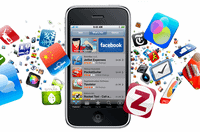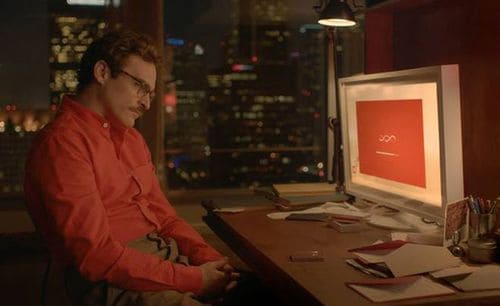TOMORROWLAND’S FORECAST is a recurring column related to all things tomorrow – from emerging tech and culture trends to breakthroughs in artificial intelligence to new entertainment and inventions that are helping change the way we experience and understand the world around us. In short, it’s a glimpse into what the future might hold for humanity as we try and answer the ever-present question: What happens next?
Last week, a failed attempt at multitasking while in the bathroom embarrassingly resulted in me having to fish my pristine iPhone 5 out from the toilet bowl. My subsequent attempt to salvage the water-logged phone by placing it uncooked rice overnight unfortunately failed, forcing me “off the grid” for 3 days until a replacement was shipped to my house.
As this was the first time I’d ever broken one of my phones, it ended up being the longest separation I’d ever had from a mobile phone since I was a kid. And while I’d heard other people who had gone through similar situations say the temporary lack of a cell phone was “freeing” in a sense, for me it was just a frustrating and sobering reminder of how increasingly dependent many of us are on technology.
 No longer could I quickly check the weather app and see if I needed to bring a coat for potential cold fronts in the evening. I couldn’t check my email on the go, couldn’t read the daily headlines and, worst of all, couldn’t enjoy the sublime perfection of Flappy Bird while on the bus home from school (kidding….mostly).
No longer could I quickly check the weather app and see if I needed to bring a coat for potential cold fronts in the evening. I couldn’t check my email on the go, couldn’t read the daily headlines and, worst of all, couldn’t enjoy the sublime perfection of Flappy Bird while on the bus home from school (kidding….mostly).
And don’t even get me started on how difficult it was navigating around town without Google Maps. Honestly, I don’t have the slightest clue how people in the 80’s managed to get to their destinations on time…
Being “off the grid” was such an alien experience to me that once I finally got my replacement phone, I immediately felt an overwhelming sense of relief, like a vital part of who I was had returned to me.
This renewed feeling of “normalcy” with phone in hand made me think about all the things I (and millions of others) depend on technology to either accomplish or help with. Our phones and computers already aid us with so much in our daily lives: banking, gaming, reading, writing, monitoring work-outs, entertainment, work, sex, scheduling, socializing, etc, etc the list goes on. With this list constantly expanding, is it that much of a stretch then to think one day down the road we will also come to rely on our technology for companionship, intimacy, potentially even love?
Continue reading “Tomorrowland’s Forecast: Could You Date Your Computer?”
AFTER THE JUMP…
The Oscar nominated film Her, which is in the running for Best Picture tomorrow, does a great job of picking apart some of the complexities that might present themselves in this hypothetical future scenario. Set in the near future, the film stars Theodore (Joaquin Phoenix), an introverted, but eloquent homebody who begins to develop a strong emotional bond with Samantha (voiced by Scarlet Johansson), one of the world’s first artificially intelligent operating systems.

The communication and physical barriers that Theodore must overcome in his budding relationship with Samantha is part of why the film succeeds on a dramatic and emotional level and also likely convinced many viewers that such a “long-distance” relationship could never succeed in the real, physical world.
 Well-known futurist Ray Kurzweil, however, dismisses this notion in his review of the film, writing:
Well-known futurist Ray Kurzweil, however, dismisses this notion in his review of the film, writing:
… a lot of the dramatic tension is provided by the fact that Theodore’s love interest does not have a body. But this is an unrealistic notion. It would be technically trivial in the future to provide her a virtual visual presence to match her virtual auditory presence, using, lens-mounted displays, for example, that display images onto Theodore’s retinas
Despite the nitpick, Kurzwell praises the film as a breakthrough in cinematic futurism the same way The Matrix “presented a realistic vision that virtual reality will ultimately be as real as, well, real reality.” Kurzweil places artificially intelligent operating systems like Samantha around the year 2029, when the leap to human-level AI would be reasonably believable, a topic that I’ve touched on in a previous column.
Curiously enough, audience reaction to Her has been noticeably more subdued than the universal praise it has received from critics (cinema goers have given the film a so-so B-). Why is that? While some viewers may have been a tad uncomfortable with the film because it hit a little to close to home, others may have left the theater thinking the entire premise of a relationship with the “intangible” has no grounds in reality.
 But we’ve known since the beginning of the internet that the anonymity of technology and the online world can often blur the lines between what is real and what isn’t. The film Catfish and the Manti Te’o story last year both proved that people can have lasting, emotional connections to something or someone that doesn’t have a real-world counterpart.
But we’ve known since the beginning of the internet that the anonymity of technology and the online world can often blur the lines between what is real and what isn’t. The film Catfish and the Manti Te’o story last year both proved that people can have lasting, emotional connections to something or someone that doesn’t have a real-world counterpart.
That steamy sexting conversation you had over Grindr the other night? For all you know, a middle-aged woman with a stockpile of carefully sculpted ab photos was trolling you that entire time.
So when it comes down to it, is it really all that much worse if it’s a computer on the other end of that conversation down the road?
But what about you? What did you think about Her and how it presented the idea of a human-AI relationship? Could you date your computer? Sound off in the comments below.
And to hold you over until the inevitable gay-themed sequel Him in 2015, check out SNL’s (somewhat) gay parody video of the movie below.

News tips? Comments/Suggestions? Tweet me @kylergee




